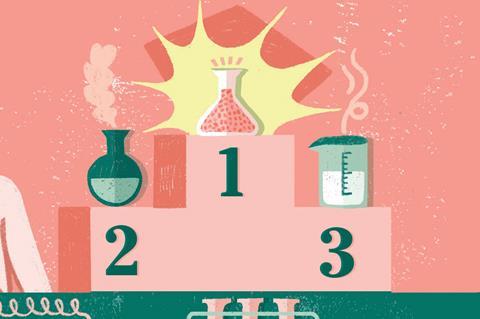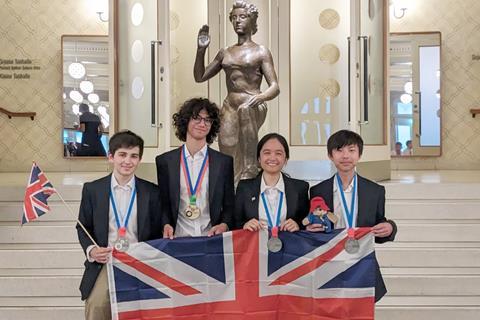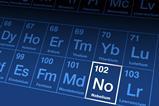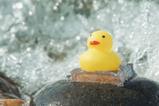Find out how your learners can take part in this valuable experience that goes beyond purely academic pursuits
The UK Chemistry Olympiad gives aspiring young chemists a chance to explore chemistry beyond the post-16 curriculum. Each year, the four top-scoring participants from the UK competition go on to represent the UK at the International Chemistry Olympiad – in 2025, this will take place in the United Arab Emirates.
Registration
Your school can register on the our website from September to early January. The recommended minimum age for participants is 16. You must be signed up to Teach Chemistry to register.
Your school can register on the Royal Society of Chemistry Education website (rsc.li/3Vg21Lv) from September to early January. The recommend minimum age for participants is 16. Make sure you’ve renewed your Teach Chemistry membership to register.

Round one
This is a written exam that learners take at their own schools in late January. In 2024, 14,915 learners participated in this round. Be prepared, because you grade your own students’ papers and submit the marks to the RSC. Approximately two-thirds of participants receive a bronze, silver or gold certificate for their efforts.
Even a seemingly low score can result in an award … 10 marks out of 82 can earn a bronze certificate
The working group behind the UK Chemistry Olympiad selects approximately 30 top-scoring students from Round one to compete in Round two. They try to achieve a mix of gender, year groups and types of school among the Round two participants.
How to prepare pupils for Round one
Bolstering problem-solving skills is the most important thing you can do to prepare your learners for the UK Chemistry Olympiad, and taking them over past questions from the UK Chemistry Olympiad is a vital part of this. You’ll find previous questions and mark schemes on the RSC Education website. Explore these during extracurricular STEM clubs – find out how other teachers do it or fold them into your curriculum as extension tasks.
Bolstering problem-solving skills is the most important thing you can do to prepare your learners for the UK Chemistry Olympiad, and taking them over past questions from the UK Chemistry Olympiad is a vital part of this. You’ll find previous questions and mark schemes on the RSC Education website (rsc.li/3WNFDu5). Explore these during extracurricular STEM clubs – find out how other teachers do it on page 21 or fold them into your curriculum as extension tasks.
You will also need to expose your learners to some areas of chemistry that regularly come up on the UK Chemistry Olympiad papers but are not covered – or are not covered in sufficient depth – on curriculums. Use the RSC’s explainers to help introduce your students to these topics.
You will also need to expose your learners to some areas of chemistry that regularly come up on the UK Chemistry Olympiad papers but are not covered – or are not covered in sufficient depth – on curriculums. Use the RSC’s explainers to help introduce your students to these topics (rsc.li/4bSOor8).
Confidence is key. You may need to help your learners gain sufficient confidence to take on questions that appear impossible at first glance. Explain questions in Round one are designed to be hard, and that even a seemingly low score can result in an award. In 2024, for instance, students needed 10 marks out of 82 to earn a bronze certificate. Use the introductory question resource to help build confidence; practice papers for the Cambridge Chemistry Challenge are also helpful for this purpose.
Confidence is key. You may need to help your learners gain sufficient confidence to take on questions that appear impossible at first glance. Explain questions in Round one are designed to be hard, and that even a seemingly low score can result in an award. In 2024, for instance, students needed 10 marks out of 82 to earn a bronze certificate. Use the introductory question resource (rsc.li/4bLNXi3) to help build confidence; practice papers for the Cambridge Chemistry Challenge are also helpful for this purpose (bit.ly/3UI20OQ).
Access the free RSC UK Chemistry Olympiad resources, which you can encourage your learners to explore on their own. Visit our UK Olympiad webpages for more details.
Visit edu.rsc.org/enrichment/uk-chemistry-olympiad to access the free RSC UK Chemistry Olympiad resources, which you can encourage your learners to explore on their own. You can also encourage your learners to explore all these resources on their own – visit our UK Olympiad webpages for more details.
Round two
This takes place over a long weekend during the Easter school holidays at a UK university chemistry department. It involves theoretical and practical instruction on topics identified as important for that year’s international competition.
The weekend starts with a group dinner, and the next day participants receive lab training and complete a practical test. On the third day, students attend lectures on topics they won’t have encountered at school and then sit a theory exam.
On the final day, the working group announce the four students selected to represent the UK at the International Chemistry Olympiad (IChO).
How to prepare pupils for Round two
Before Round two, participants receive a textbook – with a list of chapters to read – and samples of past questions. Help your students by going through this information with them.

International Chemistry Olympiad
The International Chemistry Olympiad (IChO) takes place in July each year and involves around 90 countries. To prepare the UK Olympiad team, the UK Olympiad working group hosts online study sessions and two in-person training events. Over a weekend in May and a week in late June/early July, participants practise practical skills, test their problem-solving abilities and receive additional theoretical instruction. Participants also take a mock exam at the end of the training week.
Olympiad successes

Since the UK team started participating in the International Chemistry Olympiad in 1984, it has accumulated 17 gold medals, 70 silver medals and 66 bronze medals. In 2023, Kiran Desai-Kinvig, Kiran Diamond, Perth Saritsiri and Patrick Fung (left to right) brought home gold and silver medals from the IChO in Switzerland.
The UK Chemistry Olympiad is open to all Teach Chemistry members. If you’re not already signed up, join for free today.

Getting the most out of the UK Chemistry Olympiad

It’s the competition with something for every learner and teacher. Discover the benefits of participation here
- 1
 Currently
reading
Currently
reading
Your complete guide to the UK Chemistry Olympiad
- 3
- 4
- 5
- 6
- 7


























No comments yet